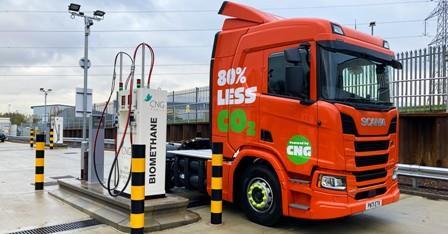
CNG Fuels saw a “massive” growth in demand last year despite the cost of living crisis, the impact of the Ukraine war and inflation, which saw gas prices soar.
The company develops, owns, and operates a UK wide network of CNG refuelling stations which it supplies with 100% renewable Biomethane (Bio-CNG).
In September last year the company opened its tenth refuelling station in Castleford, and plans to have 20 stations in operation by the middle of next year.
Speaking to MT this week, chief executive Philip Fjeld said the volume of fuel sold at its refuelling stations to customers running CNG-powered trucks shot up by 62% last year.
He added that despite rocketing fuel prices triggered by the Russian invasion of Ukraine and exacerbated by soaring inflation, none of GNG Fuels’ customers had been forced to stand down any of their trucks, even when prices were at their peak.
He said: “Yes, we had high prices in 2021 and 2022. We have had 18 months of high prices but diesel prices also rose – and in the majority of those months our customers were still saving money compared to if they had been running on diesel.”
He added: “Had we had a crystal ball 18 months ago and foreseen the Russian invasion of Ukraine and the crazy pricing, sure, we would have expected fewer orders and trucks to be parked up, but none of that has happened. Truck orders have never been larger and the number of new customers coming on board and trialling demo vehicles has never been greater.”
Most of CNG Fuels' customers are large retailers and 3PLs, and include household names such as Aldi, Royal Mail, Amazon and Warburtons, although Fjeld said increasing numbers of second and third tier fleets are coming into the CNG fold.
Read more
- CNG Fuels opens tenth biomethane refuelling station as demand rockets
- CNG Fuels opens world’s biggest biomethane refuelling station
- Natural gas refuelling returns to Scotland with new CNG Fuels biomethane station
He attributes the growing demand for CNG-powered HGVs to an increasing recognition by operators that HGV fleets have to decarbonise to meet net zero targets and to stay competitive as their customers increasingly demand low carbon logistics solutions. He also cites the need for fuel security, as evidenced by the Ukraine War, and a growing awareness of the need to take action in the face of the climate emergency, aided by the publicity that came from COP26, the global climate conference that was held in Glasgow in 2021.
“Cop26 was definitely a watershed moment – which has really reinforced the focus on decarbonisation,” Fjeld said.
The company recognises that bio-methane is not a net zero fuel and therefore cannot meet the UK’s 2050 net zero target. To this end the company is fuel agnostic in its approach to the provision of energy and has plans afoot to add electric charging points and hydrogen refuelling installations at its refuelling stations and to take part in trials of different forms of energy in the future.
However Fjeld argues that right now CNG-fuelled trucks are the best interim solution for operators looking to cut their HGV fleets’ carbon emissions.
“Bio-methane will be a very important fuel for decades to come," he said. "Our clients have to decarbonise now and cannot wait for a magic bullet that might come in the future."
CNG Fuels’ clients can also take heart that they are contributing to a significant reduction in carbon emissions.
Fjeld said: “Since 2014 we alone have cut close to 300,000 tonnes of greenhouse gases – and that has been achieved with not that many trucks or stations at the beginning.
“This year alone we will probably save 100,000 tonnes - and that will grow massively over the next few years.”
For more stories tracking the industry journey to decarbonisation see our new Freight Carbon Zero website.













